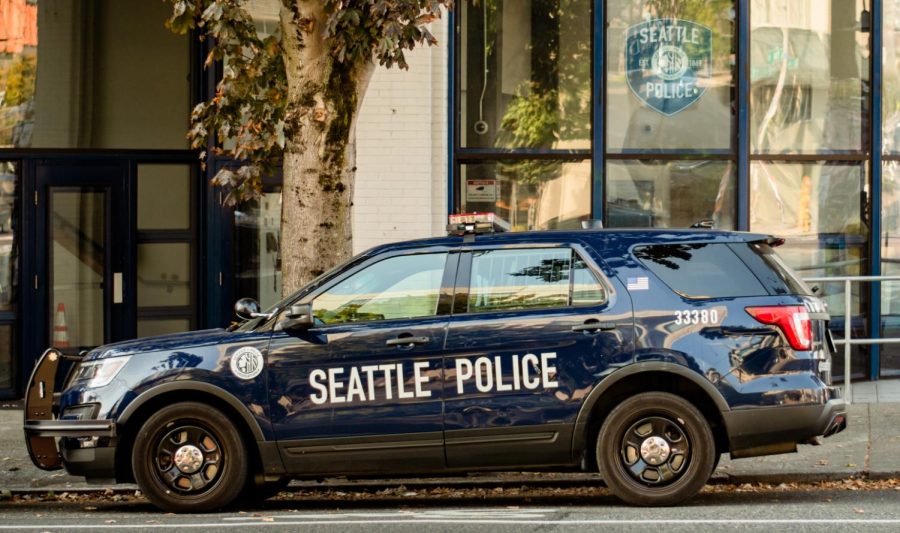Before the Badge: Meaningful Change or Futile Reform?
A Seattle Police department car parked in a reserved spot near the entrance to the East Precinct.
In response to 2020 protests demanding mass divestment from the Seattle Police Department (SPD), lingering dissatisfaction with police functions and ongoing calls to radically restructure public safety, Seattle Police Chief Adrian Diaz proposed a solution: interdepartmental reform.
Before the Badge, a five week training program that encompasses community discussion, historical instruction and mental health conditioning for SPD recruits before their 720-hour basic training, has been framed as a first-of-its-kind initiative by the city of Seattle. The program’s ultimate aim, according to Chief Diaz, is to “develop a culture of compassionate and equitable policing.”
BJ Last, an organizer for the Solidarity Budget, a coalition that advocates defunding the police by 50% and using the funds to invest in community solutions to crime and inequality, isn’t convinced.
“Before the Badge is largely another PR program for the police, similar to the community officers’ program and the coffee with a cop program. [It’s supposed] to give the illusion that there is change happening, that police have learned a lesson and are trying to change their ways,” Last said.
In May, then-interim Chief Diaz officially launched Before the Badge, prompting much celebration among local media and Before the Badge constituents. The program cost over $1.5 million to launch and an additional $446,143 is expected to flow into the training next year. The Department of Justice awarded $170,021 to the SPD to aid program development. A 2012 consent decree issued by the U.S. Department of Justice sought to evaluate the SPD’s officer training specifically in regard to excessive use of force and crisis intervention.
This investment comes after a two-year study by the National Institute for Criminal Justice Reform that shows 79.7% of the SPD’s calls were for non-criminal events; only 6% were for felonies of any kind.
Those sympathetic to the program note that it is a forward-thinking pre-academy program attempting to curb the insularity of police culture by bridging the gap between the community and the police while giving officers tools to ensure they remain mentally healthy.
In addition to the classroom-based teachings and community discussions, recruits go on ride-alongs in various precincts, partake in psychological training aimed at interpreting the signs of mental illness in the field, meet with formerly incarcerated people and attend culturally significant museums and events.
Brandon Bledsoe, a research analyst with Before the Badge, said the culturally focused instruction new recruits encounter as a part of the program humanizes disparate groups of people and familiarizes new recruits with norms and behaviors of which they might be unaware.
“The one size fits all model that’s been in policing for years is just not realistic and Before the Badge is really getting at that. There needs to be fixed responses to various communities in order to police differently,” Bledsoe said.
In a Nov. community dialogue focused on the neighborhood surrounding the West Precinct, recruits explained a recent day of cultural instruction consisting of watching the documentary “Who we are: A Chronicle of Racism in America” and engaging in discussion with the African American Community Advisory Council. One recruit shared that “learning about racism and how it’s still prevalent” paired with her implicit bias training is going to make her a better officer.
Historical teachings on anti-Black racism are conducted through a mix of virtual curricula and interaction with SPD affiliated community groups. Rank-and-file SPD members often facilitate, engage and monitor discussion. Whenever possible, recruits attend the Northwest African American Museum. The lessons are grounded in the Who We Are Project, a conglomeration of various texts, videos and auditory excerpts which aim to tell the history of white supremacy in America. While recruits have received one lecture from a local university professor on Indigenous history, no professionally trained experts teach about the abuses of police power in Black communities.
For Last, even professionally taught courses would be “doomed to fail,” because of the pernicious effects of police culture and the protect private property function of law enforcement.
Community dialogues, perhaps the most lauded flashpoint in the Before the Badge apparatus, occurred over Zoom from the beginning of September through the end of November. Meetings begin with recruits sharing why they want to become police officers. Then discussions shift to issues put forth by the community members who were able to attend the 5:30 to 7:30 virtual meeting.
For Jacqueline Helfgott, the director of the Crime & Justice Research at Seattle University and longtime research collaborator with the SPD, Before the Badge and the community discussions she facilitates respond to the fractured link between the community and police.
“This training is designed to help policing be community policing so there’s not just police culture, [but] that police culture is community culture,” Helfgott said.
Community policing, though venerated as the golden standard of reform in some circles, brings up major questions in others. For Justin Ward, the founder of DivestSPD, the pretense of community policing further enmeshes police functions in propertied interests.
“[When pro-police reformers] say ‘community policing,’ they are referring to a certain segment of the community: business owners and property holders,” Ward said. “[Recruits] mostly interact with those people, they don’t truly interact with the rest of the community, which is to say the people they will be policing.”
Still in its infancy, Before The Badge is applauded as a progressive bellwether by some and a blatant branding technique by others, but the effectiveness of the nearly $2 million program remains to be seen.


